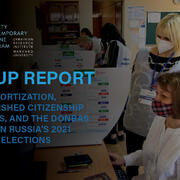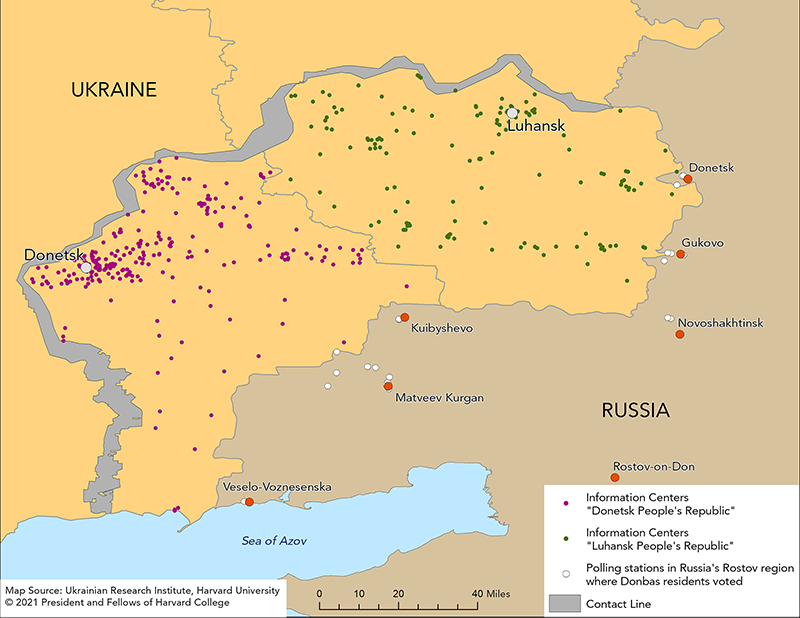
Passportization, Diminished Citizenship Rights, and the Donbas Vote in Russia’s 2021 Duma Elections by Fabian Burkhardt, Maryna Rabinovych, Cindy Wittke, and Elia Bescotti presents new data on Russia's "passportization" and voting activity during the 2021 Russian State Duma elections in the non-government-controlled areas of Ukraine, the so-called "Donetsk People's Republic" and "Luhansk People's Republic." The data analysis of turnout and voting results of Donbas residents provides a unique insight into political preferences of Donbas residents of the self-proclaimed “People’s Republics.” The report includes one map and three charts.
 Amidst Russia’s military build-up, this research provides an in-depth look at Russia's policy toward the Donbas region, and particularly the fast-tracked passportization process since 2019 to allow Donbas residents to become Russian citizens.
Amidst Russia’s military build-up, this research provides an in-depth look at Russia's policy toward the Donbas region, and particularly the fast-tracked passportization process since 2019 to allow Donbas residents to become Russian citizens.
At this point, the situation remains highly volatile and unpredictable, but the conduct of the September 2021 elections appeared to indicate that Russia was laying the groundwork for hybrid influence and external governance rather than pursuing a Crimea-style annexation.
With passportization and by engaging Donbas residents in Russian elections, Russia thereby undermines the possibility to have fair and free Ukrainian elections in the future in an unlikely scenario that the Minsk Agreements are implemented. At the same time, during the 2021 Duma elections, Russia had still been officially holding to its interpretation of the Minsk Agreements: that the territory should be reintegrated into Ukraine, but on Russian terms.
Russian-Ukrainian relations clearly are in an explosive deadlock. In this situation, passportization can serve as a tool of ambiguous Russian extraterritorial governance over the Donbas while keeping violence at a comparatively low level, or as a pretext to justify a full-scale Russian military intervention to “protect” Russian citizens.
What is a TCUP Report?
TCUP Reports highlight new research and new perspectives on major issues facing contemporary Ukraine. They are geared toward both academic and policy audiences, and they include specific policy recommendations based on the data presented in the report. Because they are not peer-reviewed journal articles, the time between submission and publication is much shorter than for most typical academic publications.
The current TCUP Report theme is Internally Displaced Persons.
For prospective authors
We are currently accepting proposals for TCUP Reports on the theme of internal displacement and reintegration of the occupied Donbas and Crimea. Authors may also be invited to submit their work by the TCUP Director.
We suggest reports around 5,000 words, although we do publish longer reports when appropriate. Reports are reviewed in-house and the time from submission to publication can be as fast as one month, depending on the author’s availability for revisions.
Email TCUP Director Emily Channell-Justice echannelljustice@fas.harvard.edu for more information.